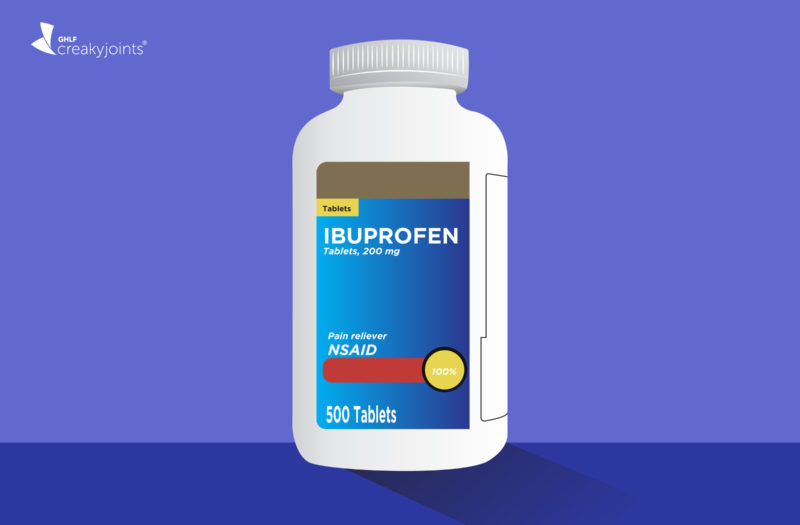Learn more about our FREE COVID-19 Patient Support Program for chronic illness patients and their loved ones.
If you have an inflammatory condition, chances are you have plenty of non-steroidal anti-inflammatory drugs (NSAIDs) like ibuprofen (Advil) or naproxen (Aleve) in your house. While those medications are well-known for easing pain and inflammation as well as reducing fever, people who develop COVID-19 symptoms might be better off avoiding them in favor of acetaminophen (Tylenol).
A few days ago, France’s health minister, Olivier Veran, warned via Twitter that COVID-19 patients in France who used NSAIDs seem to be faring worse than those who opted for acetaminophen (called paracetamol in Europe). He urged people with COVID-19 symptoms to avoid NSAIDs.
Although Veran’s statement is believed to stem from reports on just a handful of young patients in the South of France, other health experts have agreed that avoiding NSAIDs in COVID-19 patients is a wise move. In fact, a major medical journal, the BMJ (British Medical Journal), just published an article about this specific issue.
“Prolonged illness or the complications of respiratory infections may be more common when NSAIDs are used — both respiratory or septic [blood infection] complications and cardiovascular complications,” Paul Little, MD, professor of primary care research at the University of Southampton in the UK, said in the article.
Amir Khan, MD, an NHS doctor and senior university lecturer in the UK, also backed up Veran’s assertion that NSAIDs might be problematic for COVID-19 patients. “Despite all of their beneficial effects, it has long been known that anti-inflammatories can have a depressive effect on parts of our immune systems,” he wrote. “When it comes to taking them to help ease the symptoms of the common cold, we do not really have to worry about this slight but important reduction in the strength of our immune systems. We are very unlikely to develop complications from the common cold, let alone die from it… But we need our immune system in top working order in order to battle the coronavirus and win.”
Another European expert, Ian Jones, a professor of virology at the University of Reading, noted in the BMJ that COVID-19 reduces an enzyme that regulates the balance of salt and water in the bloodstream and may contribute to the development of pneumonia in some patients. “Ibuprofen aggravates this, while paracetamol [same medication as acetaminophen] does not,” he said.
Scientists writing in the medical journal The Lancet also recently discussed possible mechanisms by which NSAIDs might increase the severity of COVID-19, at least in people with diabetes or hypertension.
More Research Is Needed
It’s worth noting that there is some disagreement among physicians and public health experts as to whether or not NSAIDs are really less safe than acetaminophen. “I don’t think we’ve had any firm evidence to suggest that [ibuprofen aggravating COVID-19] is a concern at this point,” Yvonne Maldonado, MD, professor of pediatrics and infectious disease epidemiologist at Stanford University in California, told CNN.
University of Nebraska infectious disease specialist Andre Kalil, MD, MPH shared a similarly skeptical view with the LA Times. “There is no clinical data and there are no studies in humans showing that ibuprofen or paracetamol are harmful or beneficial” to people who have COVID-19, he said.
Stick with Acetaminophen for Now
Despite the uncertainty, many clinicians are now saying that acetaminophen is the safest choice if you develop a fever at this time.
“While the data is not conclusive, it makes sense to avoid [NSAIDs] since they are typically used for symptom management only,” Joshua F. Baker, MD, assistant professor of rheumatology and epidemiology at the University of Pennsylvania and Corporal Michael J. Crescenz VA Medical Center, told CreakyJoints.
Dr. Baker adds that people with inflammatory arthritis who regularly take NSAIDs to ease pain don’t need to stop using these drugs unless they develop COVID-19 symptoms. “I would continue them for symptom management as long as you are not symptomatic with fever, cough, or other symptoms of viral infection.”
If you develop COVID-19 symptoms, you should call your health care provider for guidance about getting tested and which over-the-counter medications are best for managing your symptoms. Make sure they know what other medications you are taking to manage arthritis or other conditions.
Get Free Coronavirus Support for Chronic Illness Patients
Join the Global Healthy Living Foundation’s free COVID-19 Support Program for chronic illness patients and their families. We will be providing updated information, community support, and other resources tailored specifically to your health and safety. Join now.
Day M. Covid-19: ibuprofen should not be used for managing symptoms, say doctors and scientists. The BMJ. March 17, 2020. doi: https://doi.org/10.1136/bmj.m1086.
Fang L, et al. Are patients with hypertension and diabetes mellitus at increased risk for COVID-19 infection? The Lancet. March 11, 2020. doi: https://doi.org/10.1016/PII.






